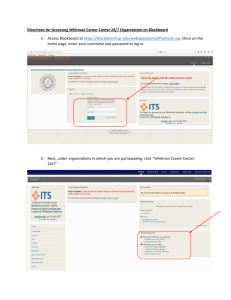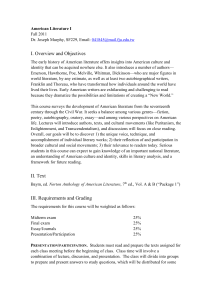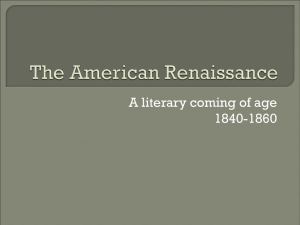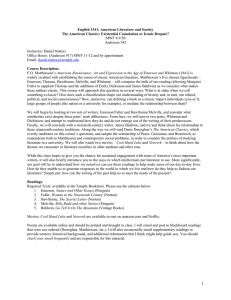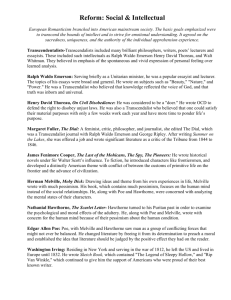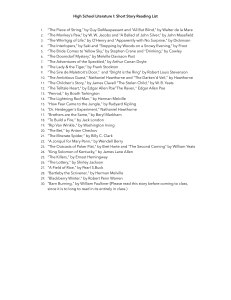Revolutionary Identity: Dissent in American Literature
advertisement
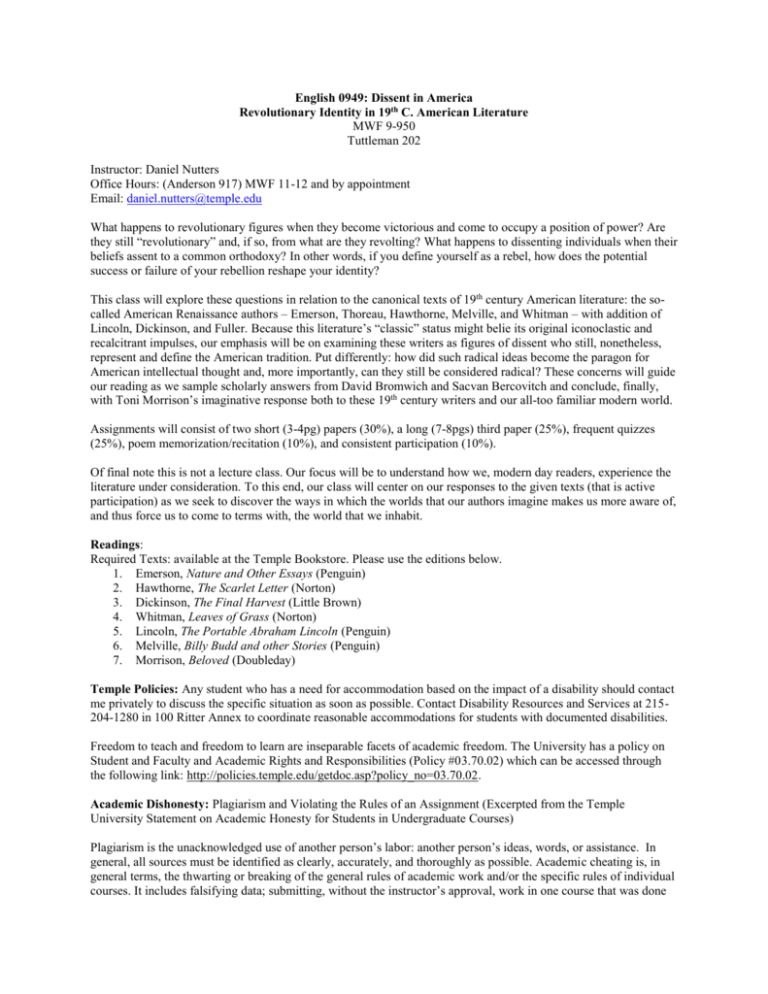
English 0949: Dissent in America Revolutionary Identity in 19th C. American Literature MWF 9-950 Tuttleman 202 Instructor: Daniel Nutters Office Hours: (Anderson 917) MWF 11-12 and by appointment Email: daniel.nutters@temple.edu What happens to revolutionary figures when they become victorious and come to occupy a position of power? Are they still “revolutionary” and, if so, from what are they revolting? What happens to dissenting individuals when their beliefs assent to a common orthodoxy? In other words, if you define yourself as a rebel, how does the potential success or failure of your rebellion reshape your identity? This class will explore these questions in relation to the canonical texts of 19th century American literature: the socalled American Renaissance authors – Emerson, Thoreau, Hawthorne, Melville, and Whitman – with addition of Lincoln, Dickinson, and Fuller. Because this literature’s “classic” status might belie its original iconoclastic and recalcitrant impulses, our emphasis will be on examining these writers as figures of dissent who still, nonetheless, represent and define the American tradition. Put differently: how did such radical ideas become the paragon for American intellectual thought and, more importantly, can they still be considered radical? These concerns will guide our reading as we sample scholarly answers from David Bromwich and Sacvan Bercovitch and conclude, finally, with Toni Morrison’s imaginative response both to these 19th century writers and our all-too familiar modern world. Assignments will consist of two short (3-4pg) papers (30%), a long (7-8pgs) third paper (25%), frequent quizzes (25%), poem memorization/recitation (10%), and consistent participation (10%). Of final note this is not a lecture class. Our focus will be to understand how we, modern day readers, experience the literature under consideration. To this end, our class will center on our responses to the given texts (that is active participation) as we seek to discover the ways in which the worlds that our authors imagine makes us more aware of, and thus force us to come to terms with, the world that we inhabit. Readings: Required Texts: available at the Temple Bookstore. Please use the editions below. 1. Emerson, Nature and Other Essays (Penguin) 2. Hawthorne, The Scarlet Letter (Norton) 3. Dickinson, The Final Harvest (Little Brown) 4. Whitman, Leaves of Grass (Norton) 5. Lincoln, The Portable Abraham Lincoln (Penguin) 6. Melville, Billy Budd and other Stories (Penguin) 7. Morrison, Beloved (Doubleday) Temple Policies: Any student who has a need for accommodation based on the impact of a disability should contact me privately to discuss the specific situation as soon as possible. Contact Disability Resources and Services at 215204-1280 in 100 Ritter Annex to coordinate reasonable accommodations for students with documented disabilities. Freedom to teach and freedom to learn are inseparable facets of academic freedom. The University has a policy on Student and Faculty and Academic Rights and Responsibilities (Policy #03.70.02) which can be accessed through the following link: http://policies.temple.edu/getdoc.asp?policy_no=03.70.02. Academic Dishonesty: Plagiarism and Violating the Rules of an Assignment (Excerpted from the Temple University Statement on Academic Honesty for Students in Undergraduate Courses) Plagiarism is the unacknowledged use of another person’s labor: another person’s ideas, words, or assistance. In general, all sources must be identified as clearly, accurately, and thoroughly as possible. Academic cheating is, in general terms, the thwarting or breaking of the general rules of academic work and/or the specific rules of individual courses. It includes falsifying data; submitting, without the instructor’s approval, work in one course that was done for another; helping others to plagiarize or cheat from one’s own or someone else’s work; or actually doing the work of another person. Of course we do not want to discourage you from using other people’s ideas or data. Our aim is exactly the opposite. But you must always make clear your sources. Penalties for Academic Dishonesty The penalty for dishonesty can vary from a reprimand and receiving a failing grade for a particular assignment, to failure for the course, to suspension or expulsion from the University. If you plagiarize on a paper, you will fail the course. This is not negotiable. If you are uncertain about what constitutes plagiarism, ask BEFORE you hand in the work. It will be too late afterwards. Schedule Week One M 1/12 NO CLASS W 1/14 Edmundson: “The Ideal English Major” (blackboard) Edmundson: “When ‘Awesome’ Isn’t Enough” (blackboard) F 1/16 Emerson: “The American Scholar” Week Two M 1/19 MLK DAY W 1/21 Emerson: “Self-Reliance” F 1/23 Emerson: “Circles” Week Three M 1/26 Emerson: “The Transcendentalist” W 1/28 Emerson: “Experience” F 1/30 Thoreau: “Civil Disobedience” (blackboard) Week Four M 2/2 Fuller: excerpt from “The Great Lawsuit (blackboard) W 2/4 Hawthorne: “Endicott and the Red Cross” F 2/6 Hawthorne: “Young Goodman Brown” Hawthorne: “The Minister’s Black-Veil” Week Five M 2/9 Hawthorne: The Scarlet Letter (1-35) **Paper #1 Due W 2/11 Hawthorne: The Scarlet Letter (36-79) F 2/13 Hawthorne: The Scarlet Letter (79-104) Week Six M 2/16 Hawthorne: The Scarlet Letter (104-136) **Poem Sign-Up Deadline W 2/18 Hawthorne: The Scarlet Letter (136-166) F 2/20 NO CLASS Week Seven M 2/23 Dickinson: poems TBD W 2/25 Dickinson: continued F 2/27 Dickinson: continued Week Eight M 3/2 SPRING BREAK W 3/4 SPRING BREAK F 3/6 SPRING BREAK Week Nine M 3/9 Emerson: “The Poet” Whitman: Preface to Leaves of Grass (616-635) Whitman-Emerson Correspondence (636-646) Whitman: “Song of Myself” W 3/11 Whitman: “Song of Myself” F 3/13 Whitman: “Crossing Brooklyn Ferry” Week Ten M 3/16 Lincoln: “Lyceum Address,” “House Divided Speech,” “Fragment on Slavery” **Paper #2 Due W 3/18 Lincoln: “Gettysburg Address,” “Second Inaugural Address” F 3/20 NO CLASS Week Eleven M 3/23 Whitman: Democratic Vistas Whitman: Specimen Days W 3/25 Whitman: “When Lilacs Last in the Dooryard Bloom’d” F 3/27 Grossman: “The Poetics of Union in Whitman and Lincoln” Week Twelve M 3/30 Bromwich: “Lincoln and Whitman as Representative Americans” (blackboard) W 4/1 Bromwich: “The American Psychosis” (blackboard) F 4/3 Melville: Bartleby Week Thirteen M 4/6 Melville: Benito Cereno W 4/8 Melville: Billy-Bud F 4/10 Melville: Billy-Bud Week Fourteen M 4/13 Bercovitch: “The American Jeremiad” (blackboard) Bercovitch: “The Symbol in America” (blackboard) W 4/15 Bercovitch: “Preface to 2012 Edition” (blackboard) F 4/17 Morrison: Beloved Week Fifteen M 4/20 Morrison: Beloved W 4/22 Morrison: Beloved F 4/24 Morrison: Beloved Week Sixteen M 4/27 Morrison: Beloved FINAL PAPER DUE DATE TBD
